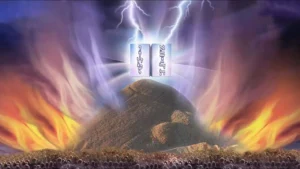[There is an] intrinsic connection between the ten utterances through which the world was created and the Ten Commandments… The verse introducing the Ten Commandments (Exodus 20:1) – ‘And God spoke all these things saying’ – consists of twenty-eight letters and seven words, the exact number of letters and words in the Torah’s first verse: ‘In the beginning God created the heavens and the earth.’
This correspondence supports the notion that the Giving of the Torah represents the fulfilment of creation.
The name of God used exclusively throughout the initial account of creation is ‘Elokim,’ the very same name used in the verse introducing the Ten Commandments. The name ‘Elokim’ connotes the mystical act of Divine contraction (tzimtzum). …The Arizal explains that God ‘contracted’ Himself, as it were, in order to create, a ‘vacuum’ or womb-like space in which a finite world could then be created.
[Through the] Ten Commandments…God had to contract and condense His infinite will into finite letters and a limited number of statements that would epitomize His moral and ethical teachings. …God [transformed] the creative energy of creation into a specific moral code for humanity by contracting and condensing His will into concrete and finite letters and commands.
Kabbalah and Chassidut teach that creation is renewed… at every moment….science now confirms this phenomenon… By connecting to God, Torah, and mitzvot, we essentially plug ourselves into the very act of constant re-creation…[which] provides human beings with…purpose.
The overall lack of purpose in life is one of the greatest contributors to boredom and destructive behavior. When human beings have purpose and direction in life, every moment is a unique opportunity to fulfil those aspirations. This then is the Jewish people’s mission in the world – to receive, act upon, and ultimately reveal this message contained in the Torah to the world – so that the world continues to be worthy of existing.

